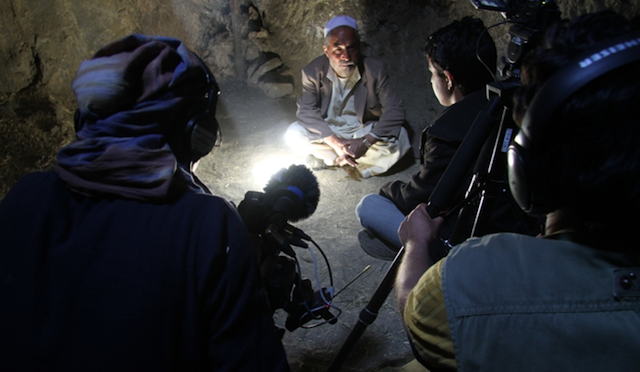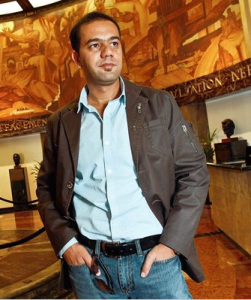
A program training young adults in journalism and digital content production in Kabul, Afghan Voices empowers the country’s people speak for themselves and gives hope to a new generation.
By Rachel Kohn
Afghan journalist Emal Haidary, 31, grew up in a family imbued with a great value for education. His mother was a teacher, his father worked at Ministry of Education, and his siblings joined the ranks of pilots, doctors, and engineers. Growing up in Kabul during the years of civil war and Taliban rule, Emal says, “the only thing that gave us hope to live on was our education.”
Emal studied law and politics and says he could have entered those fields if he wanted to. Instead, in 2001 he began working informally for foreign media outlets. He describes Afghans then as hostages to the Taliban and world opinion, unable to react and in need of a voice. “From the very beginning, I wanted to change the image of my country that was unfortunately introduced to the world after 9/11,” he says.

Finding Untold Stories
In 2010, Emal co-created Afghan Voices, a six-month “peace journalism” training program for teens and people in their early 20s from different ethnic backgrounds and provinces across Afghanistan. In addition to learning to tell stories through pictures, video and text– the focus is mainly on video because Afghanistan’s media is mostly oral– the program includes seminars on conflict analysis and transformation to update the concepts of balance, fairness and accuracy in reporting. Trainees produce content that goes beyond what Emal describes as the common narrative of Afghanistan portrayed in the world media: a country newsworthy for violence only.
“For us in Afghanistan, a country in war, peace journalism is like swimming against the current. We try to do less harm in inciting violence and conflict and do more good in providing information. Through this we try to make sure right is distinguished from wrong, truth from falsehood, real from imaginary, the constructive from the destructive, and the moral from the immoral,” he says.
“Rather than running from bombing to bombing, writing and talking almost entirely about sadness and destruction, peace journalism tells about the struggles and triumphs of a place. It tells of history, hope and happiness. That is why we started to pursue “˜peace journalism’ in Afghanistan.”
Afghans are best equipped to tell their own stories, says Emal, and the program is an opportunity for people from different ethnic backgrounds and different parts of the country to interact meaningfully while learning together. After a period of basic training at the Kabul office, participants go home and return to the capital once a month to share their work and hone their skills. Content is produced in Dari and Pashto with English subtitles, or entirely in English.
“We sent them back to their home provinces to search and find their untold stories,” says Emal, “They would come back with stunning and genuine stories that I, as a journalist who have been in this business for over a decade now, never knew about.”
As director of Afghan Voices and also the senior trainer, Emal oversees the program while preparing the curriculum, leading trainings, and approving story proposals. This year the program accepted 15 applicants out of 400, and the four instructors working under Emal are graduates of the first cycle.
Afghan Voices operates under the auspices of the Afghanistan New Generation Organization, and has been funded by the U.S. embassy in Kabul since its inception. While the latter relationship may raise the eyebrows of an American cynic, Haidary is blunt at the suggestion of any editorial oversight. “The embassy has no and zero influence on the stories we make,” he says. The trainees know where the funding comes from “and they are happy about it, because a lot of good projects are funded by the U.S.” The work of Afghan Voices trainees and alums is featured in media outlets such as Global Post, National Geographic, and TV 1, the second most popular TV station in Afghanistan, and their short films have received acclaim at domestic and international film festivals.
A visit to the Afghan Voices website reveals content as eclectic as it is engrossing. There is a segment about the change in popular fashion since the fall of the Taliban, set to catchy beats; stories of children working from morning to night to provide for their families; and documentaries celebrating the innovation and courage of individuals overcoming challenges and breaking down barriers to change.
Going through the website, one also realizes that while the focus the program is on positive portrayals of Afghanistan and civic-minded stories, these teens do not whitewash life in their country and somehow shed the scars of a life lived in the shadow of conflict. Short documentaries dealing with poverty or the brutal repression of the Taliban however, serve as a vehicle for raising social awareness and exploring the national psyche through the experiences of individuals.
Below is an excellent example:
Jalaluddin “Jalal” Jamshidy, a 19-year old from Herat, speaks from the heart in a blog post written two months into the training program:
“I believe in happy and prosperous future for Afghanistan, because I have seen potentials in young generation. The only thing they need is educating and guiding these talents. After more than four decades, hearing just the sounds of gun fire and panzer, being witness of suicide attacks and killing a lot in this country, yet we, the young generation are much more energetic and ready to grow up and make changes in this community. This is all not all about Afghanistan and Afghans that you see the pictures daily, there are extremely fabulous things with great and prideful characters in, Let’s just make it appear, let’s just take step through, let’s just expand our purpose, just show it, just thunder it up.”
His words capture the spirit of Afghan Voices: the infectious hope and determination to tell a new story about a beloved country.
This is the first article in a series on Afghan Voices. For more videos, photos, and other content please visit Afghan Voices.
 ABOUT THE WRITER
ABOUT THE WRITER
A native Michigander, Rachel Kohn is completing her Masters in International Media at American University. Before moving to the DC area, she ran her own small business as a public relations consultant and freelance writer in Jerusalem, Israel. She graduated from Brandeis University in 2007 with Bachelors degrees in Political Science and Environmental Studies, two of her passions. While attending a religious studies program in the West Bank town of Elkana from 2002-2003, she volunteered as a foreign correspondent for her hometown paper, reporting on the Second Intifada and life in the shadow of the U.S.-Iraq War. Rachel thinks that knowledge through contact is the key to understanding and coexistence. She also tends to dance in her chair if music is playing.


